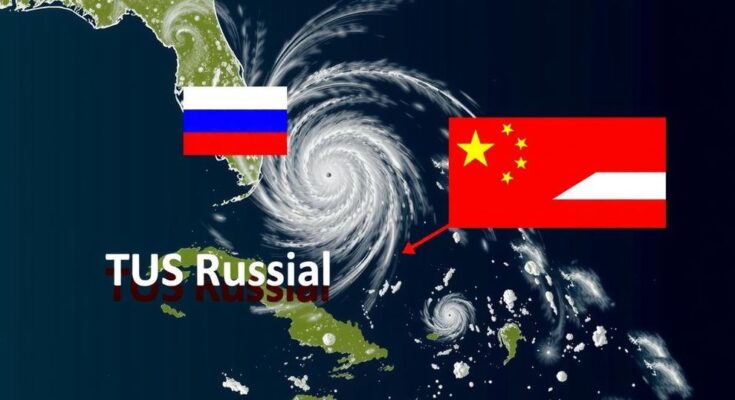A U.S. official has reported that operatives from Russia, China, and Cuba spread misinformation regarding the response to hurricanes Helene and Milton, including false claims about fund allocation. This disinformation extends to various platforms and reflects broader concerns about foreign influence, particularly in light of domestic misinformation spread by notable figures. These actions have raised alarms regarding their potential to incite violence and disrupt the upcoming presidential election, prompting President Biden to strengthen efforts against misinformation.
A recent statement by a U.S. official highlighted how operatives from Russia, China, and Cuba have disseminated misinformation regarding the United States’ response to hurricanes Helene and Milton. According to U.S. intelligence, a social media account linked to China utilized what appears to be an AI-generated image of Vice President Kamala Harris inspecting flood damage, accompanied by a misleading assertion that U.S. funds were exclusively allocated to Ukraine, Israel, and Taiwan. Additionally, a Russian state-sponsored news agency shared an AI-generated depiction of a flooded Disney World on the messaging platform Telegram, alongside provocative assertions about the government’s disaster-relief funding allocations. Cuba has also purportedly amplified claims suggesting that U.S. assistance to Israel and Ukraine has redirected resources away from domestic disaster relief, reflecting the narratives promoted by both Russia and China. CNN sought comments from the embassies of Cuba, China, and Russia in Washington regarding these allegations. This pronouncement from the U.S. government represents a significant acknowledgment of the role of foreign entities in propagating false narratives concerning the hurricanes that struck the U.S. in September and October. It is noteworthy that much of the misinformation regarding federal hurricane response has also proliferated among American citizens, including prominent public figures such as billionaire Elon Musk, the owner of the social media platform X. Claims suggesting that disaster relief funds were misallocated to migrants have gained considerable traction. The covert actions described by the U.S. official are believed to further magnify the reach of misinformation, increasing the likelihood of influencing additional individuals online. Concerns have escalated among U.S. officials regarding the potential ramifications of this misinformation, particularly in inciting violence, exemplified by the arrest of a North Carolina man accused of threatening FEMA employees involved in hurricane response efforts. This disinformation campaign coincides with ongoing efforts by foreign governments, including Russia, China, and Iran, to interfere in the upcoming presidential election. President Joe Biden expressed alarming concerns about the spread of unverified information regarding hurricane relief, prompting him to request a memorandum outlining measures for the federal government’s digital response and mitigation strategies for misinformation. Furthermore, senior officials have directed public relations teams within federal agencies to enhance their social media outreach, showcasing imagery of government employees engaged in debris removal and aid distribution. While the intelligence report did not address Iranian involvement, it was previously noted that Tehran has been actively fostering discord within American society during the electoral season.
The article discusses the implications of misinformation related to the U.S. government’s response to hurricanes Helene and Milton, focusing on how foreign influence agents from Russia, China, and Cuba have played a role in spreading misleading narratives. The context involves a heightened awareness among U.S. officials regarding the potential impact of disinformation, especially as it pertains to domestic crises and its intersection with electoral integrity. The recent hurricanes provided a focal point for false narratives that questioned the government’s efficacy in disaster management, illustrated by the use of AI-generated imagery and provocative claims circulating on social media platforms. This backdrop is essential in understanding the implications of misinformation as it pertains to public perception and political consequences.
In summary, the United States is grappling with an influx of misinformation concerning its hurricane relief efforts, with foreign entities from Russia, China, and Cuba actively involved in disseminating misleading content. The concern is compounded by the role of domestic misinformation which has gained traction among the American populace. President Biden’s proactive steps to address the spread of false information underline the seriousness of the issue, particularly with the looming presidential election. The potential for such misinformation to incite violence and undermine public trust in governmental agencies necessitates urgent attention and response from federal authorities. The continued monitoring of foreign disinformation campaigns remains critical in safeguarding the integrity of both disaster relief operations and the electoral process.
Original Source: www.cnn.com




